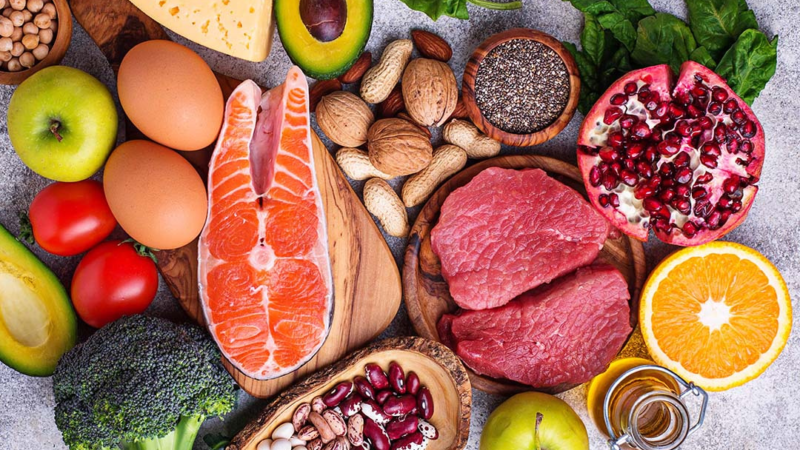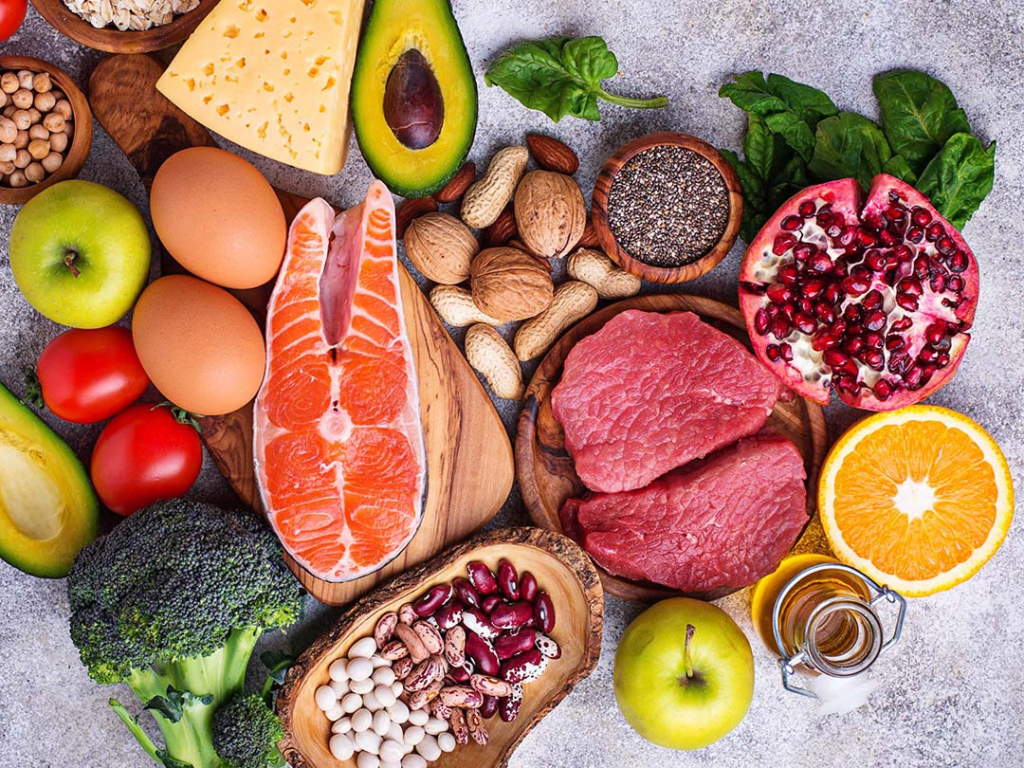Macronutrients 101 – The Ultimate Walk-Through

How Proteins, Carbs, and Fats Impact Your Health
Macronutrients—proteins, carbohydrates, and fats—are the three essential components of every diet. These nutrients provide the energy your body needs to function, build muscle, and repair itself. However, understanding how to balance them correctly can be the key to achieving your health and fitness goals.
In this Macronutrients 101 guide, we’ll break down each macronutrient, explore how it affects your body, and discuss how to balance your intake for optimal health.

1. What Are Macronutrients?
Macronutrients are nutrients that your body needs in large amounts for energy and basic bodily functions. They include:
- Proteins: Essential for muscle repair, growth, and overall bodily function.
- Carbohydrates: The body’s primary source of energy.
- Fats: Crucial for hormone production, brain health, and energy storage.
Unlike micronutrients (vitamins and minerals), macronutrients are required in larger quantities to fuel your body. Each plays a distinct role in your metabolism and health.
2. The Role of Proteins in Health
Protein is a vital macronutrient responsible for building and repairing tissues, including muscles, organs, and skin. It is also important for enzyme function, hormone production, and immune health.
Benefits of Protein:
- Muscle growth and repair: Protein provides the amino acids needed to build and repair muscles after exercise.
- Satiety and weight management: Protein is the most satiating macronutrient, meaning it helps you feel fuller for longer and can prevent overeating.
- Energy: While not the body’s first choice for energy, protein can be used as an energy source when necessary, particularly during periods of caloric restriction.
Best Protein Sources:
- Animal-based proteins: Chicken, turkey, fish, eggs, and lean cuts of beef or pork are excellent sources of complete proteins, containing all essential amino acids.
- Plant-based proteins: Beans, lentils, quinoa, tofu, and tempeh provide high-quality protein for those following plant-based diets.
The amount of protein you need depends on factors such as your activity level, age, and goals. For most people, aiming for 0.8 to 1.2 grams of protein per kilogram of body weight is a good general guideline.
3. Understanding Carbohydrates and Their Function
Carbohydrates are your body’s main source of energy. They are broken down into glucose, which fuels your brain, muscles, and organs. However, not all carbs are created equal.
Types of Carbohydrates:
- Simple carbohydrates: Found in sugars and processed foods, simple carbs are quickly digested and can lead to rapid spikes in blood sugar.
- Complex carbohydrates: Found in whole grains, legumes, and vegetables, complex carbs are digested more slowly, providing a steady source of energy and helping to keep you fuller for longer.
Benefits of Carbohydrates:
- Energy: Carbs are the body’s preferred source of energy, especially for high-intensity activities like exercise.
- Brain function: Glucose, derived from carbs, is the primary fuel for the brain.
- Gut health: Fiber-rich carbohydrates support healthy digestion and gut microbiota.
Best Carbohydrate Sources:
- Whole grains: Brown rice, quinoa, oats, and whole wheat bread are packed with fiber and essential nutrients.
- Vegetables: Leafy greens, sweet potatoes, and other vegetables provide complex carbohydrates along with important vitamins and minerals.
- Fruits: While containing natural sugars, fruits like apples, berries, and oranges also offer fiber and important antioxidants.
Aim to get most of your carbohydrates from complex, whole food sources, which provide a steady release of energy and prevent blood sugar spikes.
4. The Importance of Healthy Fats
Fats often get a bad reputation, but they are an essential part of a healthy diet. They provide long-lasting energy, support brain health, and are necessary for the production of hormones.
Types of Fats:
- Unsaturated fats: Found in foods like avocados, olive oil, nuts, and seeds, these are considered “good” fats that support heart health and reduce inflammation.
- Saturated fats: Found in animal products and some plant oils (like coconut oil), these fats can be consumed in moderation, though excess intake has been linked to an increased risk of heart disease.
- Trans fats: These are artificial fats found in many processed foods and should be avoided, as they can increase the risk of heart disease and other health issues.
Benefits of Healthy Fats:
- Energy storage: Fats are the body’s most energy-dense macronutrient, providing 9 calories per gram compared to 4 calories per gram from protein or carbs.
- Brain function: The brain is made up of nearly 60% fat, and healthy fats support cognitive function and mental clarity.
- Hormone regulation: Fats are required for the production of key hormones, including those that regulate metabolism and reproductive health.
Best Sources of Healthy Fats:
- Avocados: Rich in heart-healthy monounsaturated fats and fiber.
- Nuts and seeds: Almonds, walnuts, chia seeds, and flaxseeds provide healthy fats and plant-based protein.
- Oily fish: Salmon, sardines, and mackerel are excellent sources of omega-3 fatty acids, which support heart and brain health.
Incorporating healthy fats into your diet can enhance the flavor of your meals, keep you satisfied longer, and provide a range of health benefits.
5. How to Balance Macronutrients in Your Diet
Balancing macronutrients is essential for overall health, but the ideal ratio varies from person to person depending on factors such as activity level, fitness goals, and metabolism.
General Guidelines for Macronutrient Ratios:
- Protein: Should make up around 15-30% of your daily calorie intake. Those focused on muscle growth or weight loss might need a higher protein intake.
- Carbohydrates: Typically, carbs should constitute 40-60% of your daily intake, though lower-carb diets may be beneficial for those with specific goals like fat loss.
- Fats: Should account for about 20-35% of your daily calories, with a focus on unsaturated fats.
Tips for Balancing Macronutrients:
- Focus on whole foods: Prioritize nutrient-dense foods like lean proteins, whole grains, vegetables, and healthy fats.
- Listen to your body: Pay attention to how your body responds to different macronutrient ratios and adjust accordingly.
- Stay flexible: There’s no one-size-fits-all approach. Some people thrive on higher-carb diets, while others do better with more fats or proteins.
By understanding how proteins, carbs, and fats work together in your body, you can create a diet that supports your health, energy levels, and fitness goals.
6. Common Macronutrient Myths Debunked
There’s a lot of confusion surrounding macronutrients, leading to myths and misinformation. Let’s clear up a few common misconceptions:
Myth 1: Carbs Make You Fat
This is one of the most common myths in the fitness world. Carbohydrates themselves do not cause weight gain; excess calorie intake does. Choosing the right carbs, such as whole grains and vegetables, can support weight management.
Myth 2: All Fats Are Bad
Not all fats are unhealthy. In fact, unsaturated fats play a crucial role in maintaining heart health, brain function, and hormone balance. The key is to avoid trans fats and limit excessive saturated fats.
Myth 3: You Need High Protein for Muscle Growth
While protein is important for muscle repair and growth, consuming more protein than your body can utilize won’t result in additional muscle gains. A balanced diet with adequate protein, carbs, and fats will lead to optimal results.
Conclusion
Understanding macronutrients is essential for building a balanced, healthy diet that supports your body’s needs. Proteins, carbohydrates, and fats each play a unique role in your health, and finding the right balance between them can help you reach your fitness goals, maintain energy levels, and support overall well-being.
By focusing on whole, nutrient-dense foods and adjusting your macronutrient intake based on your personal needs, you can create a diet that promotes long-term health and success.
This is a series of posts all about nutrition. Make sure you check out our content on healthy eating and on the best foods for weight loss and health.